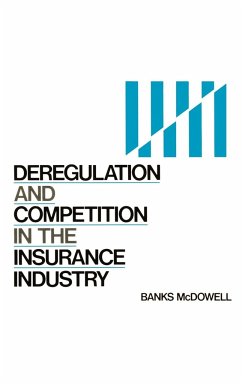This text focuses on insurance as an industry and speculates what would happen if the insurance industry were to be deregulated. The basics of insurance are incorporated throughout, which allows for a greater understanding of the possible implications of deregulation and trends in competition. . . . What could have been dry and tedious has instead been made pleasant by Banks McDowell, who writes with an easy-to-read and informative style. Examples of small case studies are woven into the text to further illustrate the issues. The material is clear, concise, and thought-provoking and is presented entirely without prejudice. Business Information ALERT The rapid rise in insurance premium costs coupled with the problem of obtaining insurance at any cost for some applicants has precipitated a crisis in the insurance industry. Many scholars and industry analysts have suggested deregulation as a solution, arguing that the actions of a free market are the only efficient means of controlling costs and affordability. McDowell offers an in-depth examination of the arguments in favor of and against deregulation and analyzes what the probable effects of such deregulation would be. Basing his study on the results of past experiments, scholarly recommendations, economic analysis, and his own work in the field, McDowell fully explores the various types of deregulation that could be implemented and assesses the degree to which they would fulfill the goals of maintaining the financial solvency of insurance companies, keeping premiums from being excessive, preventing discrimination among policyholders, and making insurance available and affordable to all who want it. McDowell begins with a discussion of what deregulation means. Subsequent chapters trace the history of insurance regulation, examine the complex goals of governmental insurance regulation, and explore the nature of insurance in contemporary society. Turning to a discussion of competition, McDowell illustrates the various levels at which insurers can compete and examines both the problems of regulation in each area and the likely effects of introducing such competition. The issue of whether regulation of the industry should be at the federal or state level receives thorough treatment, as does the question of using insurance company mergers to increase efficiency and lower costs. McDowell concludes with an enlightening discussion of the series of choices among aims and policies which must be made before the decision to deregulate or not is taken. Insurance company executives and attorneys as well as students of the insurance industry or of insurance law will find McDowell's work a cogent exposition of the complex facets of the insurance deregulation debate.








